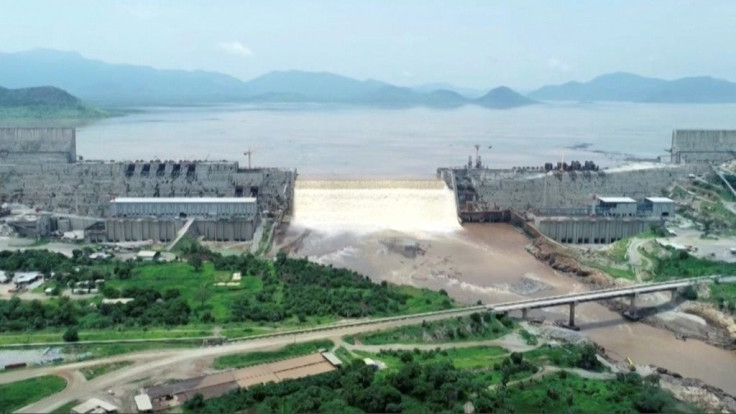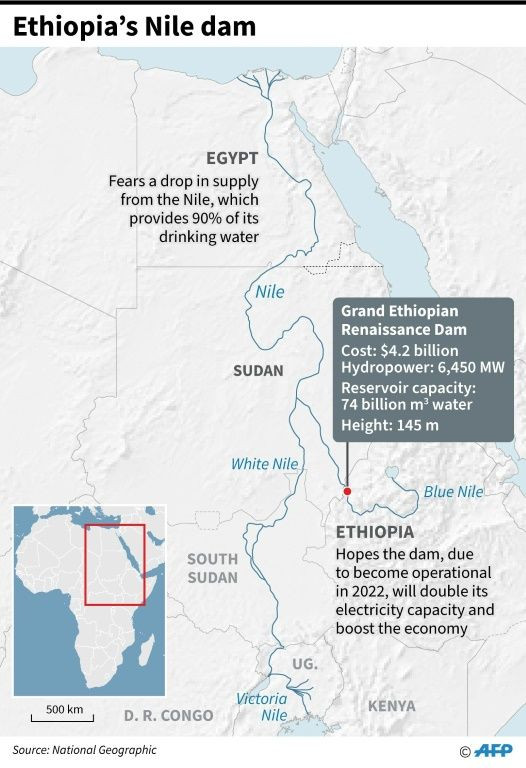Nile Dam Talks In Kinshasa End Without Breakthrough
Talks gathering Egypt, Ethiopia and Sudan on Addis Ababa's contested dam on the Nile ended on Tuesday without a breakthrough and to sharp accusations from Sudan, despite extending into a third day.
Hosted by Democratic Republic of Congo (DRC) President Felix Tshisekedi, the meeting bringing together foreign ministers from the three countries began on Sunday and had been scheduled to end on Monday.
A DRC negotiator said the talks had been extended into Tuesday to try to gain consensus on a draft final communique after Sudan had raised objections.
But the final statement, read by DRC Foreign minister Marie Tumba Nzeza, simply noted in three points that the meeting had taken place, listed its participants and thanked Tshisekedi for his work.
Sudan's foreign minister, Mariam al-Sadiq al-Mahdi, told reporters Ethiopia "threatens the people of the Nile basin, and Sudan directly".
"We hope that President Tshisekedi's judgement will be able to end... these interminable and insufficient negotiations in which the Ethiopian side places everyone before a fait accompli, in a way that clearly violates international law and the principles of good neighbourliness," she said.

The long-running dispute centres on the Grand Ethiopian Renaissance Dam (GERD), a huge hydro-electric project across the Blue Nile.
Upstream Ethiopia says power produced by the GERD will be vital to meet the development needs of its 110 million people.
But the two countries downstream fear their lifeline could be threatened.
"We are talking about taking into account all 250 million souls who live in the three countries and their interests," said al-Mahdi.
The talks were hosted by Tshisekedi as chairman of the African Union (AU), a position he assumed in February.
The head of a team of DRC experts, David Tshishiku, insisted that the Kinshasa talks were simply the beginning of Tshisekedi's efforts.

The negotiations were "the first step, on which President Tshiskedi will set out alternatives and working approaches," he told reporters, adding that the road map and timetable would be laid down later.
Al-Mahdi warned that "without a new programme (for discussions), Ethiopia has an open road to place the people of the region and the entire African continent in danger".
The US ambassador in Kinshasa, Mike Hammer, met during the night on Monday for three hours with the delegation chiefs of the three countries in a bid to push matters forward.
The GERD, whose planned capacity of 6,500 megawatts will make it the biggest dam in Africa, has been a source of tension since its first stone was laid in April 2011.
Downstream countries are especially worried about operations to fill the vast proposed lake behind the dam.
Egypt, which depends on the Nile for about 97 percent of its irrigation and drinking water, has warned of an existential threat.
Sudan fears its own dams will be compromised if Ethiopia proceeds with filling the GERD before a deal is reached.
Egypt sounded loud warnings to coincide with the Kinshasa meeting.
Its foreign minister, Sameh Shoukry, told Egyptian media that the negotiations represented "the last chance... to reach an accord".
President Abdel Fattah al-Sisi separately declared: "Nobody will be permitted to take a single drop of Egypt's water, otherwise the region will fall into unimaginable instability."
© Copyright AFP {{Year}}. All rights reserved.





















